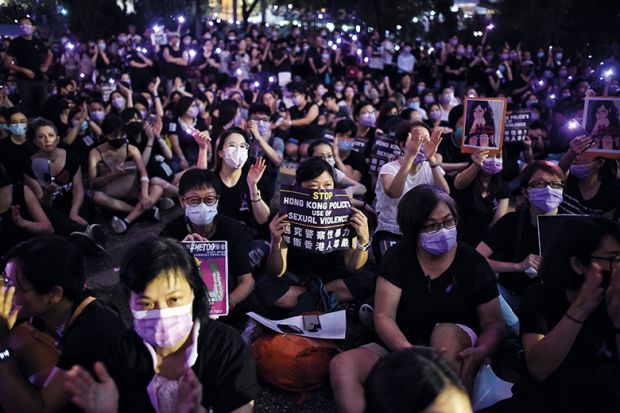Asian universities are having their #MeToo moment, as social media posts by students at universities at home and abroad about sexual abuse go viral and trigger calls for campus reform.
In Singapore, the catalyst for change was Monica Baey, a National University of Singapore student who was filmed without her consent while taking a shower. The offender, a male engineering student, was given a one-year conditional warning and suspended for a semester. In April, Ms Baey went public with her view that his punishment was too light. “I want real consequences for perpetrators that commit such acts,” she wrote. Her Instagram post garnered thousands of views and likes.
NUS reacted quickly and, the next month, Ms Baey followed up with an Instagram post titled “Closure”, crediting the university for reaching out to her, admitting the inadequacy of its procedures and setting up a town hall meeting.
Since then, NUS has established a 24-hour hotline, a victim care unit and a confidential online reporting form. This month, it implemented a QR code system to help track who has attended a compulsory course called “A Culture of Respect and Consent”, which was introduced for staff and students in July.
Singapore Management University has set up a first-response unit for both alleged victims and abusers and has also increased campus security and CCTV monitoring, while Nanyang Technological University, Singapore has launched a course on sexual consent.
In China, a wave of feminist activism caught the attention of the authorities last year, driven in part by the retelling of the story of Gao Yan, a Peking University student who killed herself in 1998 after allegedly being raped by a professor. While #MeToo posts are still widely censored online, the message got through that students wanted universities to take sexual misconduct seriously. Now the government has published a detailed protocol for handling sexual abuse in the education sector.
Leta Hong Fincher, a sociologist and author of Betraying Big Brother: The Feminist Awakening in China, told Times Higher Education that “the Ministry of Education responded very quickly, showing that the central government felt the issue required a high-level response”.
“Open letters, basically petitions, were signed by thousands of students and alumni at dozens of universities, calling for the set-up of mechanisms that address sexual harassment,” said Dr Hong Fincher. “Students were demanding in-person meetings with professors and officials. There is no question that what students and alumni did last year got results.”
However, she stressed, this was just the first step. “It is extremely new,” she said of the government response. “They almost completely ignored the problem until last year.”
Dr Hong Fincher, a research scholar at Columbia University, saw links between the #MeToo movements in the US and China. “There is such a large Chinese student population in the United States and Canada,” she said. “They have made an important contribution to sustaining the movement. They write in Chinese and use Weibo and Weixin,” two popular Chinese social media channels.
In fact, one of the #MeToo stories that went viral in China came from a Chinese student at the University of Minnesota, who has accused a Chinese billionaire of sexual assault. A video showing a seemingly intoxicated student accompanying the billionaire into an elevator spurred a debate in China about the definition of consent.
Within an Asian context, Hong Kong has been relatively open in addressing sexual misconduct. However, the problem is still pervasive on campuses. For the first time, Hong Kong’s Equal Opportunities Commission conducted a citywide poll this year on sexual harassment among university students. It found that almost one in four had been harassed, but less than 3 per cent had filed a formal complaint.
This month, a Chinese University of Hong Kong student stood in front of a 1,400-seat auditorium and testified to vice-chancellor Rocky Tuan about sexual harassment that she claimed she had suffered at the hands of the police. Even though the alleged incident took place off campus, Professor Tuan called for police and government investigations into her case and others. CUHK had “elicited help” from volunteer alumni lawyers with expertise in gender issues, Professor Tuan said last week.
Michael Tien, a Hong Kong representative to China’s National People’s Congress, recommended earlier this year that mainland Chinese universities follow the sexual harassment policies adopted by Hong Kong institutions.
Mr Tien told The South China Morning Post about some cultural reasons that sexual misconduct was not well addressed. “I think it has a lot to do with traditional Chinese values…most of the time we keep things inside us and may not even tell our parents,” he said.
Dr Hong Fincher felt that the younger generation would continue to push for change. “There’s a new level of awareness among students. They are forcing universities to respond, and this will be continued,” she said.
POSTSCRIPT:
Print headline: #MeToo movement hits Asian campuses
Register to continue
Why register?
- Registration is free and only takes a moment
- Once registered, you can read 3 articles a month
- Sign up for our newsletter
Subscribe
Or subscribe for unlimited access to:
- Unlimited access to news, views, insights & reviews
- Digital editions
- Digital access to THE’s university and college rankings analysis
Already registered or a current subscriber? Login








